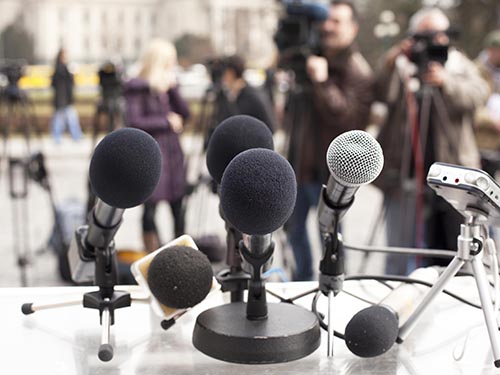How to Conduct a Journalistic Interview
How to Conduct a Journalistic Interview
Proper research and preparation are essential to a successful interview.
Grades
3–5,
6–8

One of the hardest skills for a young reporter to master is
interviewing. It takes preparation and persistence to conduct a good
interview. Follow these steps and learn how to interview like a pro.
Be sure to write all your questions down in a notebook, then practice asking them with a partner. Become very familiar with your questions before you go into the interview.
You can also use the time you are waiting to make notes about the surroundings. You won’t remember details later, so write them down.
After the interview, while the details are still fresh in your mind, write everything down you can remember about the person you interviewed. Don’t forget to make note of the sounds in the background. Take note of what was happening around you. Write it all down as soon as possible.
At home, expand your notes by following up on things you learned in your interview with more research.
Step 1: Research, Research, Research
Then research some more. The only way to come up with good questions is to know everything there is to know about your subject.Step 2: Contact the Person You Wish to Interview
Ask when a good time would be to do the interview. Be polite. Say "please" and "thank you." Try to set up the interview in person. If this isn't possible, then set up a phone interview.Step 3: Read Over Your Research and Brainstorm a List of 15 Questions
The more specific your questions are, the better. And never ask questions that can be answered with a simple yes or no. Make your interviewee talk.Be sure to write all your questions down in a notebook, then practice asking them with a partner. Become very familiar with your questions before you go into the interview.
Step 4: Come Prepared
You will want to bring:- A pencil
- A notebook
- A list of good questions
- A recording device (always ask permission before recording an interview)
Step 5: Be on Time
Arrive at your interview with plenty of time to spare. If you’ve never been to the place where your interview is taking place, go early and scout it out. There is nothing more unprofessional than a reporter who is late.You can also use the time you are waiting to make notes about the surroundings. You won’t remember details later, so write them down.
Step 6: Conduct Your Interview in an Organized, Timely Manner
During the interview:- Be courteous to your subject.
- Always take time to ask for an explanation about things you don't understand.
- Don’t be afraid of uncomfortable silences and pauses.
- Let the interview take its natural course.
- Look the person in the eye when asking questions.
- Always listen carefully to the answers. Each answer could lead to more questions or include an answer to a question you haven’t asked yet. Don't ask a question that has already been answered. Your subject will know you weren't listening and be insulted.
- Don't read through your questions one right after another like you can't wait to be finished. Conduct your interview like a conversation. One question should lead naturally into another. If you are LISTENING to the answers this will come naturally.
- Also, take notes on what the person looked like, what the person was wearing, where he or she sat. If the interview is in an office, make notes of what is on the walls and on the desk. The objects people surround themselves with hold important clues to their personalities. Ask about any object that interests you. You’ll find some good stories.
Step 7: Even If You Are Recording an Interview, Take Notes
Don't try to write every word said. It will slow down the interview. Just take down the highlights.After the interview, while the details are still fresh in your mind, write everything down you can remember about the person you interviewed. Don’t forget to make note of the sounds in the background. Take note of what was happening around you. Write it all down as soon as possible.
At home, expand your notes by following up on things you learned in your interview with more research.

